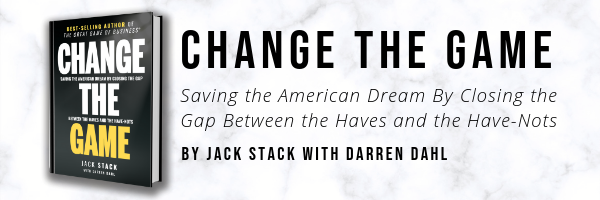
The big payoff to us for playing The Game is that we become a more educated, more flexible organization. We can respond instantaneously to changes in the market. We can turn on a dime for a customer if we have to. We can respond to problems in the length of time it takes to place a phone call.
We can do all that because we have a company filled with people who not only are owners, but who also think and act like owners, not like employees. That’s an important distinction. Getting people to think and act like owners goes far beyond giving them equity.
Many companies set up Employee Stock Ownership Plans expecting some miraculous change of attitude in the workforce. Then they’re shocked to find that people still think and act like employees: they insist on being told what to do, they won’t take initiative or responsibility, they make excuses and blame other people for their own failures, they constantly pass the buck to someone else.That’s the antithesis of ownership. Owners, real owners, don’t have to be told what to do—they can figure it out for themselves. They have all the knowledge, understanding, and information they need to make a decision, and they have the motivation and the will to act fast. Ownership is not a set of legal rights. It’s a state of mind. You can’t give people that state of mind in one fell swoop. You can only nurture it through a process of education.

And the process doesn’t stop, because business is always changing—markets are changing, technology is changing, customers are changing, and the needs of the company are changing. So the demands of ownership are always changing. To keep up with those demands, you have to keep learning. The nice part is that, as you learn, you grow, you get more out of life, and you have fun.
The whole idea behind The Game is to create an environment in which people are learning all the time. They’re seeing all kinds of situations. We’re showing them both sides of every story, allowing them to make decisions, to fail with any incorrect decisions they make, and to learn from their failures and try again. The numbers are an important part of that. They serve as the bond, the basis of trust. By giving people the numbers, I can say to them, “If you don’t believe me, look it up. See if what I’m saying isn’t true. This is the life we’re dealing with. It may be frustrating, but so is life. There’s nothing hidden here. It’s all there in the numbers.”
Excerpted from The Great Game of Business.
The original Great Game of Business book started it all, but now's your chance to order Jack Stack's latest book, Change the Game, to learn how creating an ownership mindset has impacted businesses in every sector.
.png)



.jpg)








.png)

